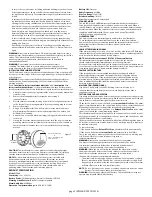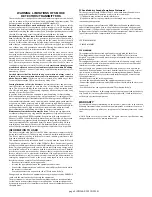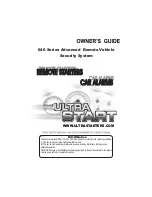
page 2(SD360-EI02 10/2014)
•
In very cold or very hot areas, including unheated buildings or outdoor rooms.
If the temperature goes above or below the operating range of smoke detec-
tor, it will not work properly. The temperature range for your smoke detector is
0~49ºC.
•
In very dusty or dirty areas, dirt and dust can build up on the detector’s sens-
ing chamber, to make it overly sensitive. Additionally, dust or dirt can block
openings to the sensing chamber and keep the detector from sensing smoke.
•
Near fresh air vents or very drafty areas like air conditioners, heaters or fans,
fresh air vents and drafts can drive smoke away from smoke detectors.
•
Dead air spaces are often at the top of a peaked roof, or in the corners
between ceilings and walls. Dead air may prevent smoke from reaching an
alarm. See Figures 4 and 5 for recommended mounting locations.
•
In insect-infested areas. If insects enter a detector’s sensing chamber, they
may cause a nuisance alarm. Where bugs are a problem, get rid of them before
putting up a detector.
•
Near fluorescent lights, electrical “noise” from fluorescent lights may cause
nuisance alarms. Install smoke detectors at least 5 feet (1.5 meters) from such
lights.
WARNING:
Never remove power from a DC-power operated detector to stop a
nuisance alarm. Open a window or fan the air around the detector to get rid of the
smoke. The alarm will turn itself off when the smoke is gone. If
nuisance alarms persist, attempt to clean the detector as described in
this Installation Manual.
WARNING:
Do not stand close to the detector when the alarm is
sounding. The alarm is loud in order to wake you in an emergency. Too
much exposure to the horn at close range may be harmful to your hearing.
INSTALLING YOUR SMOKE DETECTOR
The SD 360 smoke detector is made to be mounted on the ceiling or on the wall if
necessary. Since this smoke detector is a single-station type, it cannot be linked to
other detectors.
WARNING:
Do not connect the SD360 smoke detector to any other alarm or
auxiliary device. Connecting anything else to this detector will keep it from
working properly.
Read “
LOCATIONS TO INSTALL YOUR SMOKE DETECTORS
” and “
LOCATIONS NOT TO
INSTALL YOUR SMOKE DETECTORS
” section in this Manual first, then decide where to
install your smoke detector. Please follow these steps to install your smoke detector:
1.
At the place where you are going to install the detector, draw a horizontal line
six inches long.
2.
Remove the mounting bracket from your unit by rotating it
counterclockwise.
3.
Place the bracket so that the two longest hold slots are aligned on the line. In
each of keyhole slots, drawing a mark to locate a mounting. plug and screw.
4.
Remove the bracket.
5.
Using a 3/16-inch(5mm) drill bit, drills two holes at the marks and insert
plastic wall plugs. Put the detector away from plastic dust on it when you
drill holds for mounting.
6.
Using the two screws and plastic wall plugs (all supplied), attach the bracket
to the wall.
7.
Line up the slot of the bracket and the detector. Push the detector onto the
mounting bracket on turn it clockwise to fix it into the place. Pull onward on
the smoke detector to make sure it is securely attached to the mounting
bracket.
CAUTION:
This smoke detector comes with cover latches that will prevent
the smoke detector cover from closing if battery is not installed. This tells you
that the detector will not work until a new battery is properly installed.
NOTE:
The alarm horn will beep once after the detector is installed with
battery and mounted with bracket 2~4 seconds. This means the smoke
detector is working normally and also indicates that the battery is positioned
properly. Close cover, and then press the test button, holding it down for
about 3 seconds until the horn sounds. The horn should sound a loud,
pulsating alarm. This means the unit is working properly.
PRODUCT SPECIFICATION
Model:
SD360
Sensitivity
: 1.38 – 2.36%/ft
Battery Power:
3V lithium battery, Duracell or Panasonic CR123A
Warning Sound Pattern:
Three Pulse
temporal pattern
Alarm Audibility:
85dBA/3m
Operation Temperature Range:
0~49ºC (32ºF~120ºF)
Battery Life:
One year
Radio Frequency
: 433MHz
Wireless Range:
35m (115ft)
Relative Humidity:
10~85%
Size:
120mm diameter x 5.3mm depth
STANDBY MODE
The red LED, as the ALARM indicator, are featured with the smoke detector.
It can be seen through the clear test button on the cover of the unit. When a
red LED flashes once every 334 seconds, it indicates the smoke detector is under
normal operation. When the smoke detector senses smoke and simultaneously
sounds an audible alarm with 3 beeps, pause and 3 beeps. The red LED
will flash continuously and rapidly.
SILENCE FEATURE
The silence feature can temporarily quite an alarm for up to 10 minutes.
To use this feature, press test/silence button on the cover when it alarms.
However, if the smoke concentration around the smoke detector unit is still
at alarming level after 10 minutes of silence, the unit will re-alarm
immediately.
LOW BATTERY WARNING SIGNAL
If the alarm horn begins to chirp once in 43 seconds with yellow LED flashing, it
indicates that the smoke detector’s battery is weak. Replace new battery immedi-
ately. Keep fresh batteries on hand for this purpose.
NOTE: Use only the replacement CR123A 3V (Panasonic) battery
This low battery warning signal should last for up to 30 days, but you
should replace the battery immediately to secure your protection.
Also upon initial low battery condition, the detector will send a low battery indica-
tor to the receiver after 5 minutes. The smoke detector will continue to transmit a
low battery signal every 12 hours until the battery is replaced.
TAMPER SWITCH FEATURE
:
If the smoke detector is not mounted into the bracket properly within 5
minutes after battery is installed, the tamper function is triggered and the
Yellow LED is steadily on. If the smoke detector is still not mounted into the
bracket properly 5 minutes after battery is installed, you will hear temporal
three sound with yellow LED steadily on until smoke detector is mounted
back into bracket properly.
MALFUNCTION (ERROR) SIGNAL
:
If you hear 3 “beep” with yellow LED flashing 3 times in 43 seconds, it
indicates that the smoke detector does not work properly, please have it
repaired or serviced.
TESTING YOUR SMOKE DETECTOR
If you suspect that your smoke detector does not go into alarm, test it by pressing
the test button to ensure it works properly. When the Test button is pressed, the
smoke detector sends an alarm signal to the wireless receiver.
*If the smoke detector zone is defined as an
Instant 24hr Fire Zone
, the alarm
signal is immediately sent to the central monitoring station; contact the Central
Monitoring Station to advise them of the test and to avoid a false alarm.
* If the smoke detector zone is defined as a
Delayed 24hr Fire Zone
, the alarm
signal is not sent to the central monitoring station.
Test the alarm weekly by pushing firmly on the test button for around 4 seconds
until the horn sounds, the sound pattern is 3 beeps, pause, and then 3 beeps with
red LED flashing continuously and rapidly.
*If the smoke detector beeps three beeps with yellow LED flashing three times in
43 seconds, it indicates the smoke detector is not working properly, it requires to
be repaired or serviced.
To cease the alarm:
* If the zone is defined as
Delayed Fire Zone
, the alarm will stop automatically.
* If the zone is defined as an
Instant Fire Zone,
enter a valid code # (PIN).
This is the only way to make sure that the smoke detector unit is working prop-
erly. If the unit fails to test properly, have it repaired or
replaced immediately.
WARNING
:
Never use an open flame of any kind to test your alarm.
You may set fire to damage the alarm, as well as your home. The built-in
test switch accurately tests all functions as required by Underwriters’
Laboratories. They are the only correct ways to test the unit.
WARNING:
When you are not testing the unit and the alarm horn sounds
this means the smoke detector has sensed smoke or combustion particles in
the air. Be sure that the alarm horn is a warning of a possible serious
situation, which requires your immediate attention.
•
The alarm could be caused by a nuisance situation. Cooking smoke or a dusty
furnace, sometimes called “friendly fires” can cause the alarm to sound. If this
happens, open a window or fan the air to remove the smoke or dust. The alarm
will turn off as soon as the air is completely clear.
NOTE:
Do not disconnect the power or remove the battery from the smoke
detector. This will remove your protection from fires.
WARNING:
Do not use any other kind of battery. This smoke detector may not
operate properly with other kind of battery.
Figure 7
Mounting
bracket
Test / Silence Button
&
Power / Smoke Detectors
LED indicator






















